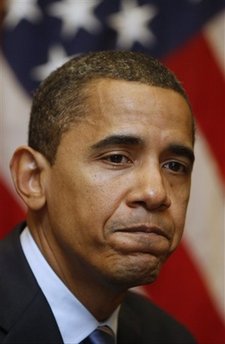
President Barack Obama recently called Rep. John Conyers Jr. to express his frustrations with the Judiciary Committee chairman’s criticism.
In an interview with The Hill, Conyers said his opinions of Obama’s policies on healthcare reform and the war in Afghanistan have not sat well with the president.
Obama’s decision to challenge Conyers highlights a sensitivity to criticism the president has taken on the left. Conyers’s critical remarks, many of which have been reported on the liberal-leaning Huffington Post, appear to have irritated the president, known for his calm demeanor.
Conyers, the second-longest-serving member of the House, said, “[Obama] called me and told me that he heard that I was demeaning him and I had to explain to him that it wasn’t anything personal, it was an honest difference on the issues. And he said, ‘Well, let’s talk about it.’”
Sitting in the Judiciary Committee’s conference room two days after Obama delivered his speech on Afghanistan, the 23-term lawmaker said he wasn’t in the mood to “chat.”
Obama’s move to send in 30,000 troops to Afghanistan by the summer of 2010 has clearly disappointed Conyers.
He said he intends to press his case in writing soon.
“I want something so serious that he has to respond in writing, like I am responding in writing to him,” he said.
“Calling in generals and admirals to discuss troop strength is like me taking my youngest to McDonald’s to ask if he likes french fries,” Conyers said.
Many on the left have argued that military leaders routinely respond to crises by calling for more troops.
“I’ve been saying I don’t agree with him on Afghanistan, I think he screwed up on healthcare reform, on Guantánamo and kicking Greg off,” Conyers said, referring to the departure of former White House counsel Greg Craig.
Craig was a leading proponent in the White House of closing the terrorist detention center at Guantánamo Bay and releasing photos of detainees undergoing torture. Closing the military prison has proven to be politically difficult, and Obama reversed field on the photos, opting not to make them publicly available.
The White House did not respond to requests for comment for this article.
The liberal Conyers has been an outspoken proponent of a single-payer healthcare system and a critic of U.S. involvement in the wars in Afghanistan and Iraq.
He has also been at odds with White House policy on extending expiring provisions of the Patriot Act, crafting legislation that is to the left of the Senate’s version.
Obama and Conyers have a complicated and nuanced relationship.
Conyers was the first member of the Congressional Black Caucus to endorse Obama over then-Sen. Hillary Clinton (D-N.Y.) for the 2008 Democratic nomination for president.
Conyers earlier this year noted that he spent most weekends in 2007 and 2008 on the campaign trail trying to get Obama elected.
“I did whatever was necessary to be done to win. I met with ministers, I met with unions, I met with lawyers, I met with community activists, I met with healthcare people,” Conyers explained in early April.
The 80-year-old lawmaker, who participated in the civil rights movement alongside Martin Luther King Jr., does not shy away from saying what is on his mind.
The Michigan Democrat, a friend of liberal filmmaker Michael Moore, said he was “getting tired of saving Obama’s can in the White House,” after progressive Democrats were forced to vote for a healthcare bill that did not call for a “robust public option” and includes language opposed by abortion-rights supporters.
Since the House narrowly passed its healthcare bill, Conyers has grown increasingly frustrated with what he sees as the White House’s willingness to weaken the role of the government in administering the proposed new benefits.
Conyers also said last month that Obama was “getting bad advice from … clowns” on Afghanistan, according to a report in the Detroit Free Press.
At times, Conyers has shown his pragmatic side. For example, he has abandoned hope of moving his legislation calling for a commission to review whether the U.S. government should pay reparations to descendants of slaves. He has called his measure too controversial.
On the morning following Obama’s landmark speech on the war in Afghanistan, Conyers sent around a “Dear Colleague” letter to Democratic and GOP lawmakers interested in joining his newly formed “Peace and Progress in Afghanistan Caucus.”
In the letter, Conyers explained that the caucus “will serve as an informal bipartisan group of members dedicated to reorienting the United States’ commitment to the Afghan government and people by emphasizing indigenous reconciliation and reconstruction strategies, rigorous regional diplomacy, and swift redeployment of the U.S. military.”
No comments:
Post a Comment